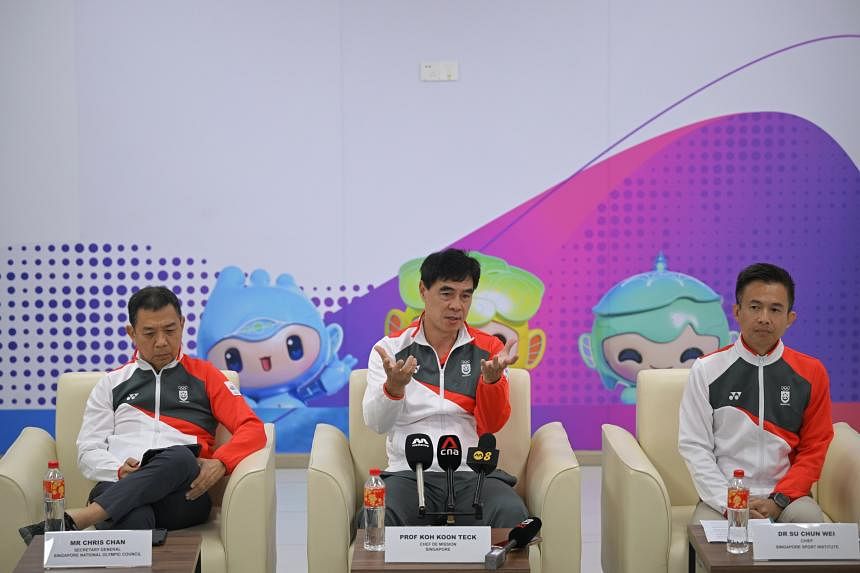HANGZHOU – A number of firsts were notched for Singapore’s team sports in Hangzhou, with women’s football and hockey making their debuts or long-awaited returns as the Asian Games contingent swelled to its largest-ever at 427.
But it was not all roses for the athletes, as there were disappointments and several teams suffered heavy defeats.
While the women’s rugby sevens team beat India 15-0 in the group stage, they were on the receiving end of some lopsided scores, losing to Japan (57-0), Hong Kong (29-0) and Kazakhstan (50-0).
The men’s hockey team finished 12th out of 12, while sepak takraw, whose men’s team won two bronzes at the 2018 Jakarta Games, were winless in the regu and quadrant events, falling to teams like Japan and South Korea. There were also Olympians and others who posted poor results.
In view of these performances, when asked by The Sunday Times if the selection criteria for the Asiad could be fine-tuned, Singapore National Olympic Council (SNOC) secretary-general Chris Chan said at a press conference on Saturday that the athletes had qualified on merit by meeting the marks set by the body.
Athletes qualify by achieving at least sixth place in timings, distances and scores from the previous edition. For team sports, they should be ranked in the top six in Asia.
Noting the competitiveness and “luck of the draw” for some sports, Chan said: “We will go back and certainly look at why some of these sports made it to the Games but somehow they didn’t get the results.
“But I’ve seen the draw sometimes and ask myself why can’t our athletes meet Nepal or Maldives players? Why did we have to meet the Chinese players? But that’s the luck of the draw.
“At the end of it all, we have to look at it positively... They were given the go-ahead not by wild card – they went through the selection process and we analysed the results.”
At the 2018 Games, Singapore fielded 264 athletes – largest before this edition – who won four golds, four silvers and 14 bronzes.
Their best showing was in 2006 in Doha, Qatar, when the 134-strong contingent took home 8-7-12.
Noting that there were complications caused by the one-year delay of the Games, Chan said the selection of some athletes was based on results in 2021, when there were not enough competitions owing to the Covid-19 pandemic and results had to be extrapolated.
Some young athletes who were “marginally off” the qualifying mark were given the nod by the SNOC if their projections showed that they were “going up”, he added.
But Chan insisted the aim was for athletes not just to gain exposure, but to be competitive at the Games.
“When we select athletes, we always tell them we don’t select you for exposure, for experience,” he said. “We tell the athletes you get the experience from your own competitions and you meet our mark and you go to the Games, we expect you to be competitive.”
Also at the press conference were chef de mission Koh Koon Teck and Singapore Sport Institute (SSI) chief Su Chun Wei.
Su noted that the Asian Games are an important platform for athletes to push themselves to excel beyond South-east Asia, while stressing that sports like table tennis and badminton feature a world-class field.
Citing the example of sprinter Marc Louis, who broke the 22-year-old national 100-metre record, he said: “If we really have the ambition to break through at the world level, consistently medal at Olympic Games and world championships, the Asian Games provides the platform for athletes to measure and to do their personal best and break national records.
“The field is strong and therefore it pushes the athletes beyond what they can imagine in normal training and in the SEA Games platform.”


